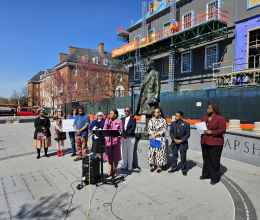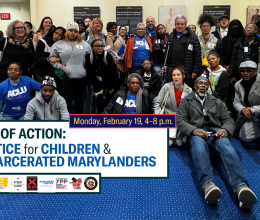
BALTIMORE – Concerned about the continuing high, and disproportionate, level of suspensions in Maryland public schools and the lack of significant progress action to address the problem, the American Civil Liberties Union of Maryland and the Open Society Institute-Baltimore have written to Maryland State School Superintendent Nancy Grasmick and the Maryland State Board of Education seeking reform. The 5/23/11 letter notes that state public school leaders have expressed concern about the impact of suspensions on youth, and asks that they now take specific actions swiftly to address the problem.
“The time is now to ensure that children in Maryland public schools are not harmed by harsh and ineffective discipline policies,” says Bebe Verdery, Director of ACLU of Maryland's Education Reform Project. “It is wrong to interfere with the right of every student to receive the education they are promised by our state constitution by rigidly following discipline procedures that are not tailored to meet the needs of the student and that do not provide an opportunity for parents and guardians to work positively with the school to de-escalate discipline issues.”
“We would hope that the state would build on the good work begun by Dr. Alonso in Baltimore. Once suspension rates drop, schools have better attendance rates and, thus, fewer dropouts and better school outcomes,” notes Diana Morris, director of Open Society Institute-Baltimore.
"Zero tolerance" policies in discipline cases have received significant media attention recently, especially in the Baltimore Sun. But suspension rates are unacceptably high, even in school systems that have more nuanced discipline codes. Yet, research shows that suspension increases a student's likelihood of dropping out, increases juvenile justice involvement, and carries mental health and physical safety risks, as well as a host of other negative impacts.
Last year, the ACLU and OSI provided comments to the School Board agreeing that educational services ought to be provided to long-term suspended and expelled students. That discussion grew out of the School Board's decision in the Atanya C. case, in which a 9th grade girl in Dorchester County was kept out of school from the time of her offense in September for the entire school year, with limited access to any educational services.
At that time, the ACLU and OSI also strongly urged the board to look more broadly at the disproportionate pattern of suspensions and expulsions across the state, particularly in some Eastern Shore counties. However, the recommendations from the State Board's examination of the issues in Atanya C., issued in its August, 2010 report, were limited and failed to address the broader pattern of disproportionate and excessive numbers of suspensions.
It is time to abandon current ineffectual policies and adopt ones that will hold school systems accountable for positive and fair practices. In the letter, ACLU and OSI call on the State Board of Education and the Department of Education to:
• develop a department protocol for regularly monitoring available data to identify inequities and inappropriate disciplinary actions, including the use of police referrals for school incidents that outside the school would not be a crime;
• require school systems, particularly those with high (above state average) rates of out-of-school suspensions, to develop plans to reduce them and submit those plans to you for review.
• develop a system of sanctions for school systems that do not hesitate to suspend students for non-violent, first-time infractions that in more effective systems would result in a parent conference or counseling.
###






